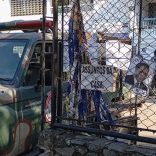Mozambique: Support for the Local Force a “major priority” - President
Special report: The machines didn’t break down, they were tampered with | CIP Mozambique Elections

FILE - [For Illustration purposes only. [File photo: Miramar]
There were few real mechanical failures and most of the alleged registration equipment problems were caused, intentionally, by brigade members to prevent opposition party members from registering, according to an investigation by the CIP Elections Bulletin.
A Mobiles ID (registration compter) expert claims that the level of breakdowns reported in these elections has never occurred in any country. And it is strange that the problems reported by supervisors are not communicated to the Lexton/Artes Gráficas consortium that has technicians to repair the malfunctions, which adds to the suspicion of manipulation of the equipment for political ends.
For example, there were allegedly major problems taking photographs and recording fingerprints. Failures in capturing images and prints do happen, but they are related to the quality of light and possible glare on the skin of the voter’s face because it is oily. The same happens with fingerprints when the fingers are damp or oiled. But when digital capture fails, mobiles have the manual capture system. The two systems cannot fail simultaneously. In other words, in case of failure of automatic capture, it is recommended to use the manual system.
Furthermore, the brigades were instructed that in case of image capture failures, they should recommend the voter to pass a cloth or towel on the face, or even their hands, as a solution.
What was happening is that the brigadistas purposely did not resort to manual capture or recommend voters to pass a towel or cloth on their cheeks to clean the glare from their skin.
The CIP Bulletin’s investigation reveals that mobiles have few problems and none of them are related to what is always reported. The most common problems with these machines have to do with overheating or manufacturing defects or else software or hardware problems. All cases are less than 1%. In other words, they are insignificant. According to the specialist, if the fault is in the software, the repair is done in minutes or hours and never lasts a day, contrary to what is reported. If the problem is a hardware one, there is also a guarantee of immediate substitution.
Now, the problems presented by the supervisors during the voter registration had nothing to do with those that are common in this type of technology. Many of these problems can only be
Many of these problems can only occur in situations of bad connections or by disconnection of cables, either by mistake or on purpose. The specialist we have been quoting stresses that no problem can take more than a day without being solved. He finds it strange that there are breakdowns that last for weeks.
The CIP Bulletin knows that the central STAE, the one in Maputo City, and the one in Matola had spare equipment to replace them in the event of a breakdown at any point. In fact, 42 mobiles were distributed over the last two weeks to the central and northern provinces..
The argument presented by STAE in Tete that some machines showed images of hyenas is, for the specialist, an example of exaggeration in the manipulation of equipment. According to him, in none of the 161 countries did the machines show images of animals.
Observers reported 25% of registration posts with equipment or supply problems, but it now appears that most of the “problems” were not reported to STAE or Lexton/Artes Gráfica, and were instead intentional and organised manipulation of the equipment to block registration of voters from opposition parties.
- “Beira Supervisors” group showed how to manipulate machines
Messages exchanged in the WhatsApp group “Beira Supervisors” and in Ribáuè and Matola show how to manipulate the registration equipment, and are being used to prevent voter registration in areas of significant opposition voters.
WhatsApp messages between supervisors and the district director of STAE in Beira allow us to conclude that a large part of the breakdowns are manipulated because the pattern of breakdowns follows this guidance.
For example, Supervisor Linete asks her colleagues to standardise their machine-handling techniques. She asks them to follow the technique she is using of informing undocumented voters that “the machine does not recognize witnesses and ballots, it is the machine system” and not her. Then the voter has no choice but to give up, aware that “the problem is the machine” and not the supervisor.
Another supervisor explains the other technique he uses: “at the end of each citizen’s registration, the computer first asks to record. Once the recording is complete, the next step is to print, just double-click on the image in the corner”. They do not explain what happens after the double click, but it is certainly a technique that benefits Frelimo, because in the following comment, Supervisor Jose acknowledges that “your experience is good, and thanks to that double click we are reaching one hundred and something (voters)”.
The third technique is explained by supervisor JB when he states that after the Frelimo inspectors, with whom he coordinates, warned him that the higher number of voters in the queue “was not ours”, “I turned off the machine and only started operating it again when the situation benefited us”. He acknowledges that he made the decision unilaterally which could have cost him dearly. But “fortunately now we have this support” from the director.
Zília Nagimo has a different technique from the other supervisors: “In our post, when it is ours (referring to a Frelimo voter), we witness in silence: the supervisor and the operator, or the two operators, which is me and the typist, so as not to flag” as opposition.
The district director of STAE in Beira congratulates his colleagues, whom he calls “family”, because “the enemy [the opposition] is already afflicted, but we need to continue to attack”. And he orders the supervisors to “accept witnesses and ballot papers” only if this is to benefit Frelimo. In response, JB reconfirms: “Therefore, if it is to favour our people, I will resume the practice”. Supervisor JB thanked his director for his guidance, and said, “It was worth the endorsement (of the director), because in fact I had already stopped accepting witnesses [to identify people registering, as allowed in the law] after noticing that the only ones who brought people without documents were the MDM and Renamo inspectors and the secretaries of the neighbourhood, unit and blocks” who in Beira are MDM and not Frelimo. According to Supervisor JB, the secretaries of neighbourhoods, units and quarters “were almost already camped outside the registration post”
He announced that in addition to having abolished, on his own initiative, the witnesses and ballots, he had also already taken another decision to prevent the registration of opposition voters: rejecting the voter cards of individuals not from Beira. He only accepted them if they were to benefit Frelimo.
JB proudly reports to the group that “The enemy has already realised that in my post it is impossible, so much so that the floods have decreased and I have noticed the flow of residents from the constituency.”
In another communication, JB informs the director that the floods are decreasing because they [opposition voters] have realised that they will not register by these two ways [witnesses and notes]” and throws a suggestion to his director: “but we can relax as we have sure information that the floods will resume, but this time they will an bring ID application receipt. So they are applying for IDs en masse. The enemy is cunning.”
The blocking of opposition voters ended up affecting Frelimo voters as well, confused with those of opposition parties. This worried supervisor Mateus Capondo, which made him warn others to strengthen collaboration with Frelimo party inspectors.
“You have supervisors who are rotating comrades in the census posts because of a lack of knowledge of where they come from and also I think because of a lack of communication,” reveals Mateus Capondo who reports that he has received “five comrades leaving from another post.”
“This type of incident can happen” because “in this type of cleaning [of opposition voters], one is always going to get away, especially when the supervisor does not know ours from the area where he or she is based”. And he suggests that “you have to communicate a lot with the supervisor and pay a lot of attention”. She warned that this exercise “isn’t easy, but it’s possible”.
Gisela Patrício developed the “sleeping on the computer” technique. But, before explaining what the technique consists of, she says that “in the first few hours”, her census post “was “full” or in a group in our favour, but around 2pm the scenario changed” and the queue was full of opposition voters. To block them “I asked the inspector to go out and check the queue to make sure if they were ours or not”. The inspector complied. On his return, the inspector informed the supervisor that “most of them were not ours”. So “I sent the typist to sleep on the computer. I mean, taking more time to register a voter, even though I knew there was one and another of us in the queue”. In the end, he said he had asked the inspector to go and identify “our comrades to come tomorrow, at the first hour”.
She ends the message by saying that the technique had an effect because “in my post, many people return (home) without registering”. And she swears that if it is to help Frelimo “I will do it as many times as necessary”.
In addition to this technique, in other posts, in some districts, mobiles were allegedly malfunctioning when, in fact, they were fully operational. They were used in the dead of night to register voters. The most obvious case was in Ribáuè district, where two machines from the town-hall posts were removed to register residents from outside the municipal boundaries. Supervisors claimed that the two machines were broken and the brigade had stopped registering for a week due to alleged machine breakdowns. An identical scenario occurred in the city of Matola, where the machines were reported broken down when, in fact, they were being used during the night, until around 11pm, and on several days.












Leave a Reply
Be the First to Comment!
You must be logged in to post a comment.
You must be logged in to post a comment.